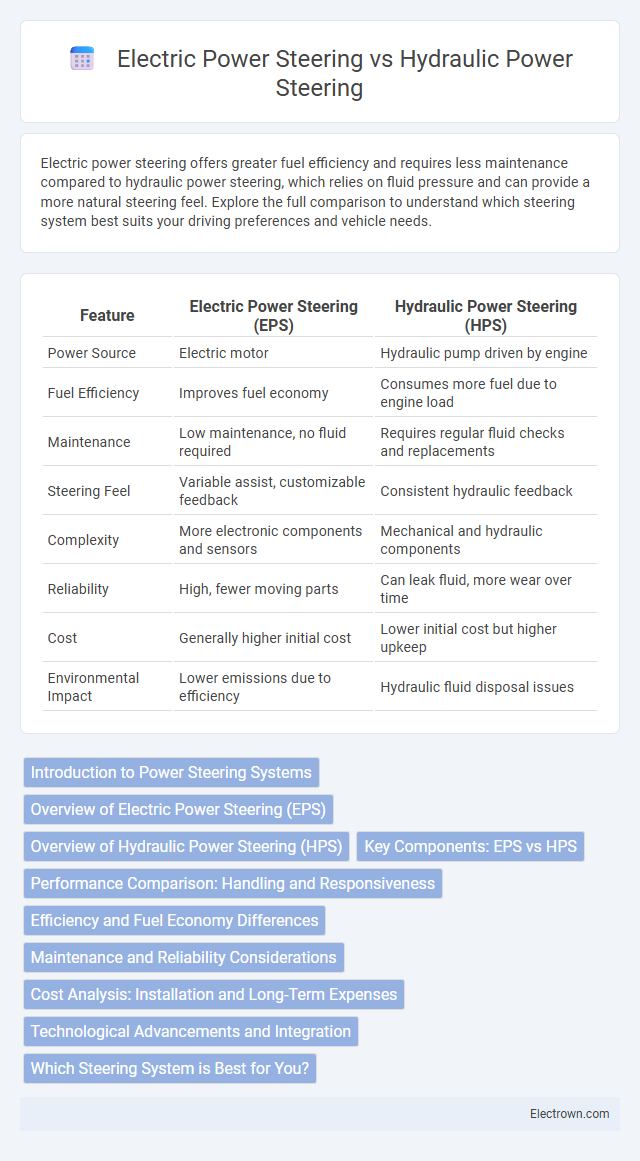Electric power steering offers greater fuel efficiency and requires less maintenance compared to hydraulic power steering, which relies on fluid pressure and can provide a more natural steering feel. Explore the full comparison to understand which steering system best suits your driving preferences and vehicle needs.
Table of Comparison
| Feature | Electric Power Steering (EPS) | Hydraulic Power Steering (HPS) |
|---|---|---|
| Power Source | Electric motor | Hydraulic pump driven by engine |
| Fuel Efficiency | Improves fuel economy | Consumes more fuel due to engine load |
| Maintenance | Low maintenance, no fluid required | Requires regular fluid checks and replacements |
| Steering Feel | Variable assist, customizable feedback | Consistent hydraulic feedback |
| Complexity | More electronic components and sensors | Mechanical and hydraulic components |
| Reliability | High, fewer moving parts | Can leak fluid, more wear over time |
| Cost | Generally higher initial cost | Lower initial cost but higher upkeep |
| Environmental Impact | Lower emissions due to efficiency | Hydraulic fluid disposal issues |
Introduction to Power Steering Systems
Electric power steering (EPS) uses an electric motor to assist the driver in steering, offering improved fuel efficiency and precise control compared to hydraulic power steering (HPS), which relies on a hydraulic pump driven by the engine. EPS systems reduce energy consumption by activating only when steering assistance is needed, whereas HPS continuously runs, impacting fuel economy. Your vehicle's handling and responsiveness benefit from the lightweight and adaptive nature of electric power steering, making it the preferred choice in modern automotive design.
Overview of Electric Power Steering (EPS)
Electric Power Steering (EPS) uses an electric motor to assist the driver in steering, offering improved fuel efficiency and reduced maintenance compared to Hydraulic Power Steering (HPS). EPS systems provide variable steering assistance based on vehicle speed, enhancing control and precision in diverse driving conditions. Your vehicle benefits from quicker response times and integration with advanced driver-assistance technologies through EPS.
Overview of Hydraulic Power Steering (HPS)
Hydraulic Power Steering (HPS) uses a hydraulic pump driven by the engine to generate fluid pressure, which assists in steering effort, making it easier to turn the wheels. This system relies on hydraulic fluid, a pump, a steering gear, and valves to provide precise steering feedback and control. Despite being heavier and less fuel-efficient compared to Electric Power Steering (EPS), HPS is favored in heavy-duty vehicles for its robust steering performance and durability.
Key Components: EPS vs HPS
Electric Power Steering (EPS) systems use an electric motor, torque sensor, and control unit to assist steering, improving efficiency and reducing energy consumption. Hydraulic Power Steering (HPS) relies on a hydraulic pump, fluid reservoir, and hoses to provide steering assist through pressurized fluid, which can lead to higher fuel consumption. EPS offers precise control with fewer moving parts, while HPS involves complex hydraulic components that require regular maintenance.
Performance Comparison: Handling and Responsiveness
Electric power steering (EPS) provides precise handling and quick responsiveness due to its direct electronic control and variable assist capability, resulting in improved fuel efficiency and easier customization for different driving conditions. Hydraulic power steering (HPS) offers a more natural steering feel and consistent feedback but can be less responsive at low speeds and less efficient due to continuous engine-driven hydraulic pump operation. Advances in EPS technology have led to superior performance in modern vehicles, delivering sharper steering accuracy and adaptive responsiveness compared to traditional hydraulic systems.
Efficiency and Fuel Economy Differences
Electric power steering (EPS) delivers higher efficiency and better fuel economy compared to hydraulic power steering (HPS) by using an electric motor that operates only when steering assistance is needed, reducing parasitic engine drag. Hydraulic power steering relies on a constantly running pump driven by the engine, increasing fuel consumption and lowering overall vehicle efficiency. The reduced energy demand of EPS systems translates into measurable fuel savings, especially in stop-and-go traffic conditions.
Maintenance and Reliability Considerations
Electric power steering (EPS) requires less maintenance than hydraulic power steering (HPS) because it has fewer mechanical parts like pumps and hoses that can wear out or leak. EPS systems rely on electric motors and sensors, offering higher reliability and consistent performance over time with minimal fluid changes or inspections. Your choice between EPS and HPS will impact long-term maintenance costs and system durability, with EPS often preferred for modern vehicles due to its efficiency and reduced upkeep.
Cost Analysis: Installation and Long-Term Expenses
Electric power steering (EPS) typically incurs lower installation costs due to fewer mechanical components and simpler integration with modern vehicle electronics. Long-term expenses for EPS are reduced by improved fuel efficiency and minimal maintenance compared to hydraulic power steering (HPS), which requires regular fluid changes, pump replacements, and potential leaks. While HPS might have a lower upfront cost in some cases, its ongoing maintenance and fuel consumption generally result in higher lifetime expenses.
Technological Advancements and Integration
Electric power steering (EPS) utilizes advanced sensors and electric motors that enable precise, energy-efficient steering control, significantly improving vehicle performance and fuel economy compared to traditional hydraulic power steering (HPS). EPS systems seamlessly integrate with modern driver-assistance technologies such as lane-keeping assist and automated parking, enhancing overall driving safety and convenience. Your choice between EPS and HPS directly impacts compatibility with cutting-edge automotive technologies and future vehicle upgrades.
Which Steering System is Best for You?
Electric power steering (EPS) offers precise control, improved fuel efficiency, and reduced maintenance compared to hydraulic power steering (HPS), making it ideal for everyday driving and eco-conscious users. Hydraulic power steering delivers a more natural, linear feel and better feedback, preferred by performance enthusiasts and those driving heavy-duty vehicles. Choosing the best system depends on your driving style, vehicle type, and priority for fuel economy versus steering feedback.
Electric power steering vs Hydraulic power steering Infographic

 electrown.com
electrown.com